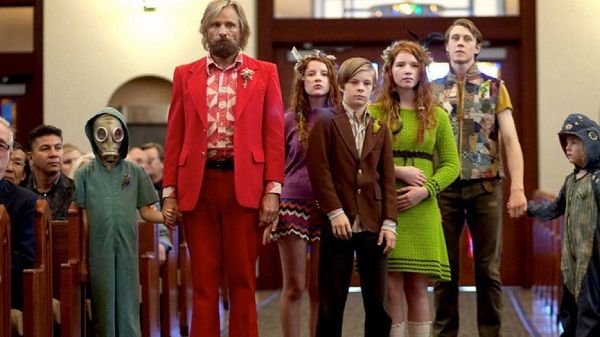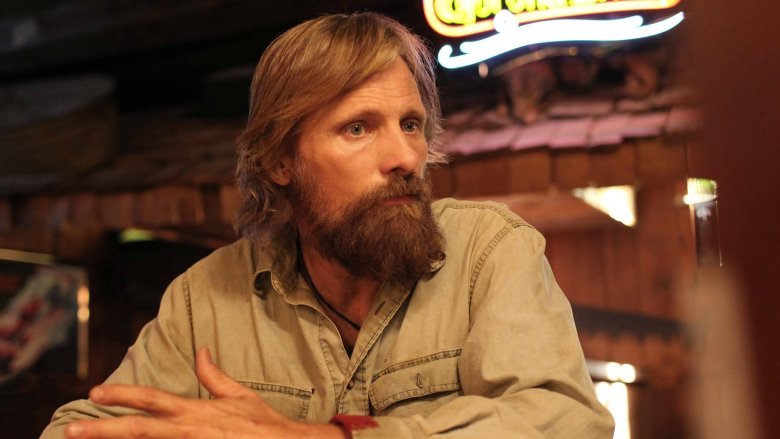We have all heard about people who have got tirred from the commercial society, selling their household goods and going to live in the woods. Well, that's a similar story. Viggo Mortensen plays Ben. 15 years ago, Ben moved to the wild northwest of the United States with his wife Leslie (Trin Miller) and their newborn son, Bodevan (George McKay). There are five more children and a tragic loss to leave their lost paradise, in a final attempt to reach out to modern society.

The film starts with an exceptionally beautiful frame, filled with the vast forest of wild forest. We get an idea of the virgin idyll in which the family lives. We see the growing Bodevan hunting, thus proving his courage to his father. Ben already has six children, and their mother who suffers from bipolar disorder is cured in the city. Later, we understand that she has committed suicide at the hospital where she is placed. This is where the story starts - they have to get to the funeral in New Mexico. Once we've got the idea of the family's primitive life, there's another show that directors Matt Ross ("Silicon Valley") is doing smoothly and unobtrusively. He engages us with the everyday life of such a family, we see the rituals and the small challenges that they make. Once Ben understands the death of his wife, he does not hide anything from the children. He communicates it directly and respectfully. Ben's relationship with children is at the heart of the movie. He educated them alone, giving them Dostoevsky and Karl Marx, but also Lolita. This contrasts with the preconceptions some of the outside world has. Later, we see a scene that illustrates how far ahead some of those who have gone through the school system. The word "interesting" does not apply to them - it is "dumb". Instead of saying "it was interesting," and to avoid the issue, you need to deepen, analyze, compare with your personal impressions. All important qualities that Ben emphasizes. Most importantly, he treats them as equal and respects their personal choices. He puts them on physical tests every day and teaches them self-defense. It is interesting to see a character like Ben. He openly denies the commercial society, capitalism and all its qualities. Teach his children not to celebrate Christmas: "Why celebrate a magical elf instead of a living humanist who has done so much for human rights?" Of course, here is talk of Noam Chomsky, a famous American philosopher, historian and social activist. Ben does not celebrate Christmas, and a day of Noam Chomsky sounds fun right? Oddly enough, this is one of the many ways in which we see Mortensen's character deny everything related to civilized society. The "villain" in the whole story is Jack, Leslie's father, who appears to be Ben's antipode. Taking an extreme view of childcare, the grandfather firmly states that he does not want his grandchildren to be reared in the wild. Although children are highly educated, they fail to cope with the social situations that the world gives them. This isolation in which they were born, without their choice, makes them doubt their father's choices. "Unless it comes out of a f ***ing book, I do not know anything about anything!" Bodevan furiously tells his father in one of the most emotional scenes in the movie.

"Captain Fantastic" compares the conformation of society with educated hermitage. Where it is very good to introduce a comment on the raising of children in the normal, capitalist society, it also commented on the raising of children in the forest. It shows the values that are important to a family (respect, love, understanding, compromise), but without dangling them in our face. The story is well composed and presents both the pros and cons of both sides - "civilization" and relics. The last shot of the whole movie is probably one of the most beautiful things in the whole story - long, quiet, something missing, but the whole family is preserved. Where Matt Ross fails to succeed is in the game itself. Without doing too much, we will mention that in the end something is happening that is so inappropriate that it makes the story look predictable and not so natural. The direction of the rest is, however, on a highly professional level. Laughingly, for Matt Ross, who has little experience behind the camera, but we can appreciate how much he has done to make such a profound comment on the current society and family values. We have to insert that with this role Viggo Mortensen is certainly on our list for the top 5 film dads. Do not forget "The Road," where he had to make compromises and difficult choices in a slightly different setting to keep his son innocent. Here, however, is a real superhero. Captain Fantastic is a funny, touching, warm and meaningful film about the gap between the parent and the child, the difficult choices and compromises that rise as bridges on both sides, and the cunning reconciliation of socialism and capitalism. By operating on two planes, the film does not fall into the idealistic error, but on the contrary, like the Lolita example, it requires us to do the homework.
